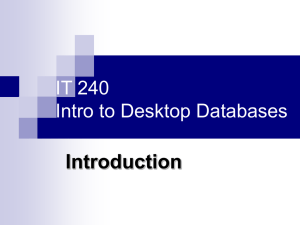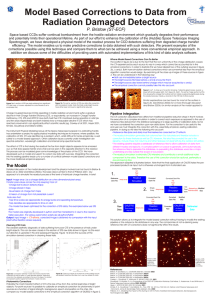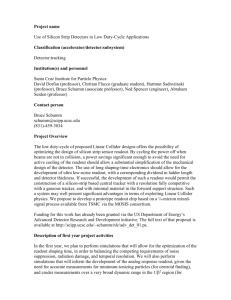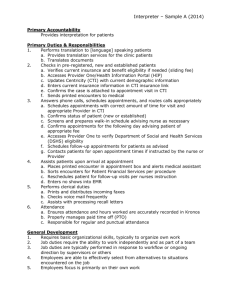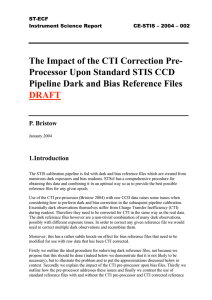The CE-STIS CTI Pre- processor- BETA Paul Bristow TIPS Feb’04 www.stecf.org/poa
advertisement
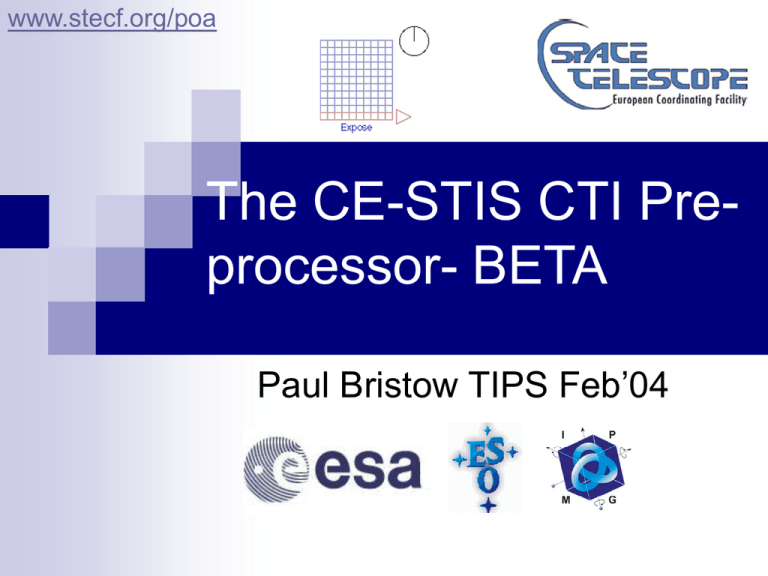
www.stecf.org/poa The CE-STIS CTI Preprocessor- BETA Paul Bristow TIPS Feb’04 The STIS Calibration Enhancement Project According to an ESA/NASA MoU A comprehensive empirical calibration pipeline already exists for STIS. We aim to improve those components which benefit from physically motivated corrections. Current work includes: Wavelength Calibration Calibration lamp line list - new lab measurements at NIST Optical Model Optimal Spectral Extraction Detector Model Pre-processor: Overview Readout model: Concept Implementation Validation Pre-processor script Handling reference files BETA version ready for testing In order to progress beyond BETA, needs criticism Readout model: Motivation A physical solution, CTI effects understood in terms of the CCD operation and environment A correction that applies to the entire 2D array: Equally valid for imaging and spectroscopy Also applicable to extended objects Portable to other space based detectors (WFPC2, ACS, WFC3?, Kepler instruments etc.) Extendable to model further aspects of CCD readout Readout Model: Concept Forward Simulation: Start with 2D Charge distribution on chip Distribution of bulk traps Shift the charge under each electrode as during readout Calculate capture and emission of charge in each shift Take into Account: Status of bulk traps Dark current Trap capture and emission timescales Chip clocking frequency, architecture, gain etc. Currently only deals with parallel CTI Correction: Raw data = >> SIMULATION Simulation output = - Raw data Difference image Raw data Difference image Corrected image Further iterations (usually not necessary): Corrected image >> SIMULATION Readout direction Cleaning CTE Trails Raw Data Quantitative Validation Matches photometric and spectroscopic empirical corrections (Goudfrooij & Kimble 2002, Bohlin & Goudfrooij 2003) well with physically realistic parameters Charge restored reliably to central isophotes of point sources => whole image array is corrected reliably. 2 CE-STIS ISRs describing these results Many parameters still not well confined - there is a lot of parameter space to search! Still some outstanding issues regarding the more precise chip details. The CTI Pre-Processor Pipeline Originally developed to automate testing and comparison to empirical models Automated application of CTI correction, CALSTIS pipeline and evaluation of corrected data Designed so that the CTI correction is a stand alone processing step executed before CALSTIS and completely independent of CALSTIS CALSTIS is run as for normal raw dataset CTI Pre-processor Tasks: 1. 2. 3. 4. 5. 6. 7. 8. 9. 10. Extracts relevant header details Corrects dark and bias reference files Updates dark and bias file keywords in header Prepares raw data for readout simulation Simulation goes forward (adds CTI effects) Simulates read out of all sub-exposures in raw data Compares output to input, difference subtracted directly from raw science extension [1,4,7…] Runs CALSTIS on corrected raw and original raw data Automatically extracts sources/spectra from CTI corrected and uncorrected calibrated data Uses empirical corrections as a comparison for extracted sources/spectra. Darks also require CTI correction Readout simulation reproduces some of the signature which is present in the standard bias files => bias files must be updated The pre-processor: obtains required reference files corrects them updates the raw header New ISR discussing this Dark reference image before and after CTI correction Readout direction Dark and Bias Reference Files Dark and Bias Reference Files Modify dark Modify bias Correct CTI and calibrate Calibrated Data Readout direction Calibrated Data Readout direction Summary Modeling concept works Pipeline implementation developed as preprocessor to CALSTIS Available for testing internally (ST-ECF/STScI) Still very much under development Potential to be exported to WFPC2, ACS ISRs available from: www.stecf.org/poa Software directly from me: bristowp@eso.org Criticism very welcome, without it this won’t get beyond BETA!




